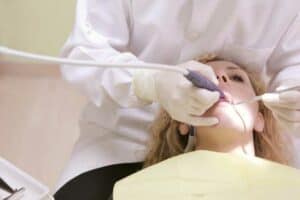
Cosmetic Dentistry & Teeth Whitening
Cosmetic dentistry has gained popularity over the years, with people seeking various procedures to enhance their smiles. One of the most sought-after treatments is teeth whitening. A bright, pearly white smile can boost confidence, but what are the potential side effects of this procedure?
Teeth whitening often involves the use of bleaching agents that can penetrate the enamel to remove stains. This process can lead to temporary tooth sensitivity, where individuals experience discomfort or pain when consuming hot, cold, sweet, or acidic foods and beverages.
In some cases, the bleaching agents used in teeth whitening can irritate the gums, causing redness and mild discomfort. However, choosing a professional whitening treatment in the comfort of your dentist’s office instead of an at-home product can help minimize the risk of gum irritation during the procedure.
Dental Fillings
Dental fillings are a common treatment for cavities, restoring the structure and function of damaged teeth. Whether you choose traditional silver amalgam fillings or modern tooth-colored fillings, both treatments can have side effects.
Patients may experience temporary tooth sensitivity after getting a filling. This sensitivity usually subsides quickly, but it’s essential to be aware of this possibility.
After your dentist places a filling, they will file it down to match the size, shape, and height of the original area. However, if the filling sits too high, you may experience jaw or tooth discomfort. The solution is easy – just call your dentist in Canton for a quick and painless adjustment.
Root Canal Treatment
Root canal treatment is often feared but it’s a necessary procedure to save a severely damaged or infected tooth. While it’s a highly successful treatment, some side effects may occur.
After a root canal, patients might experience some discomfort or mild pain, which can usually be managed with over-the-counter pain relievers. This discomfort is temporary and should subside as the tooth heals.
Different dental procedures may be necessary for a variety of different concerns, and we understand that you may feel uneasy about getting treatment. However, taking care of problems early is a crucial part of maintaining oral health. We encourage you to talk with your dentist in Canton about the pros and cons, as well as any side effects, of any recommended treatments to ease your mind and make an informed decision.
We’re always accepting new patients at our dental offices in Ann Arbor, Canton, Farmington Hills, and Livonia.

Brushing & Flossing
While this seems like the most obvious answer, the truth is brushing your teeth twice a day and flossing once a day can really work to avoid cavities. Those who follow a proper oral health care routine at home can effectively remove plaque and bacteria from teeth and reduce the risk of decay. However, it’s not enough to only brush and floss, you need a good brushing and flossing technique to really be effective. Make sure you’re using a soft toothbrush and brush gently along the gumline and all tooth surfaces. Otherwise, you could miss cleaning important areas or actually cause damage if you brush too hard. Floss in between each and every tooth, curving the floss up under the gum line for a thorough clean. Not brushing and flossing your teeth, or not doing it effectively, can increase the risk of decay.
Genetics
Genetics can play a role in so many ways, including how strong our teeth are and even the shape of our teeth. When individuals inherit weaker enamel, it can make their teeth more susceptible to decay. Additionally, teeth that are formed with deep grooves are more likely to develop cavities because those crevices provide a nice place for bacteria to hide and cause problems. However, genetics alone do not dictate someone’s cavity risk. For example, someone with genetically strong enamel can absolutely still develop cavities if they don’t brush and floss regularly or have other cavity-causing conditions.
Diet
Another factor that can determine someone’s risk of developing cavities is their diet. In fact, what we eat and drink can significantly impact our dental health. Consuming too much sugar or acid can create an ideal environment for cavities to form, which is one reason why your dentist in Farmington Hills usually advises against eating an excess of sugar. You see, bacteria in the mouth feed on sugars and produce acids as a byproduct. These acids can erode tooth enamel, increasing the risk of cavities. Additionally, many people do not drink enough water throughout the day, and that’s a concern. Water not only helps the body function properly, but it can also help wash away bacteria and neutralize acids that could otherwise wear away enamel, resulting in decay.
Professional Dental Care
Besides brushing your teeth daily and eating a well-balanced diet limited in sugar and acid, it’s important to see your dentist in Farmington Hills at least every six months for a check-up and cleaning. Professional dental care is an essential part of maintaining oral health as your dental team will be able to detect early signs of cavities and provide preventive treatments like sealants or fluoride. Those who see their dentist regularly have a lower risk of getting a cavity or experiencing other serious oral health problems whereas individuals who neglect regular dental visits or do not prioritize preventive care may be at a higher risk of cavities.
If it’s been longer than six months since your last dental visit, we welcome you to call our office to schedule an appointment today.
We’re always welcoming new patients at our dental offices in Ann Arbor, Canton, Farmington Hills, and Livonia.

If your dentist in Livonia tells you that you or your child has an impacted tooth, you may initially be a bit worried. But don’t fret. Impacted teeth are incredibly common. Even though impacted teeth are most often associated with wisdom teeth, the truth is any tooth can be impacted and can affect the development of the rest of your teeth and overall oral health.
Impacted Teeth
An impacted tooth is essentially any tooth that doesn’t come in when and where it’s supposed to. Typically when someone loses a tooth, it’s because the adult tooth is pushing through the gums and is ready to make its appearance. However, this doesn’t always happen as planned. Sometimes a baby tooth falls out and other teeth crowd the area and block where the adult tooth is trying to erupt. Other times a baby tooth just doesn’t fall out when it should. This can cause an adult tooth to shift sideways and grow inside the gums instead of poking through the top.
What Causes Impacted Teeth?
As always, every case is different, but there are some top reasons why teeth may become impacted. One of the main causes of an impacted tooth is that a mouth is just too small for adult teeth to erupt as they’re supposed to. This is often the case with impacted wisdom teeth. When there’s not enough room in the mouth for new teeth to erupt, they can become impacted. Additionally, sometimes teeth simply do weird things and can grow sideways. There’s also a genetic factor at play. If a parent had an impacted tooth, the child is more likely to also have an impacted tooth.
Problems With Impacted Teeth
Impacted teeth can affect overall oral health and overall health in a variety of ways, including:
Luckily, your dentist in Livonia can often see it coming thanks to dental x-rays. X-rays allow your dentist to take a closer look at the way teeth are erupting or have already erupted so we can make a plan for any situation.
How Do You Treat an Impacted Tooth?
First, it’s important to remember that an impacted tooth may not be an immediate cause for concern. After all, your dentist in Livonia sees this every day, and is well-equipped to treat you in a comfortable and relaxing environment. Treatment of an impacted tooth will vary depending on your specific needs, how severe the impaction is, and how many teeth are affected. Some treatment options include:
If the wisdom teeth are impacted, you may need to see a specialist to have them removed, but it’s incredibly important to extract impacted wisdom teeth. If they’re left untreated, they can cause pain as well as infection.
We understand that an impacted tooth may cause you to worry, but we’re here to help. Make sure to see your dentist at least twice a year for preventive checkups. The earlier an impacted tooth or potentially impacted tooth is caught, the treatment becomes easier. If it’s been longer than six months since your last dental appointment, we welcome you to schedule an appointment with us today.
Welcoming new patients at all of our dental offices in Ann Arbor, Canton, Farmington Hills, and Livonia.

It’s officially summer, which often means relaxing poolside with your family and friends, backyard barbeques, and vacations. But summertime can also cause disruptions in your family’s everyday life, schedules, and routines, which may mean that certain habits and necessities take a backseat. Don’t let your oral health be one of those things; turn to your dentist in Farmington Hills for some summer dental tips.
Choose Snacks Wisely
We may find ourselves snacking more frequently throughout the day over the summer months, especially if we’re popping from various picnics and barbeques. While there’s no reason you can’t enjoy some of your favorite summer treats, your dentist in Farmington Hills encourages you to choose sweet snacks, including drinks, in moderation. Limit your family’s intake of sugar-packed sodas, sports drinks, ice cream, lemonade, and candy. Water is always best when it comes to both staying hydrated and protecting your teeth.
Follow a Routine
Even though it may be tempting to fall off your regular oral hygiene routine during the summer or while on vacation, it’s incredibly important to stick to your habits all year round to keep cavities and other oral health problems away. Always brush your teeth twice a day for minutes each time, and don’t forget to floss once a day to remove plaque and bacteria from areas of your teeth where your toothbrush doesn’t reach.
Wear Sunscreen
Sun protection is key even when it’s not sunny outside. Your skin can easily be sunburned when you’re outside for an extended period of time, so make sure you lather up with sunscreen. Besides your skin, make sure you apply lip balm with an SPF-15 or higher as well. Your lips can also get sunburn which could cause cancer over time.
Swim with Caution
Whenever you’re around a body of water you should be careful. But your dentist in Farmington Hills also wants you to be careful of a lesser-known problem that can occur from too much pool time — swimmer’s calculus. Swimmer’s calculus can occur when the pH level of a pool is too low it becomes acidic. If the mouth is exposed to too much acidic water it can erode tooth enamel and cause damage. Swimmer’s calculus is one form of damage and is usually identified by brown spotting on the teeth that will need to be removed by your dentist.
See Your Dentist
Summer can be a great time to see your dentist in Farmington Hills for a checkup, especially if you have kids in school. We recommend that you call to schedule your family’s dental appointments soon, as availability tends to become limited during the next few months.
We hope that all of our patients and neighbors have a safe and happy summer full of family fun. Of course, if the unthinkable happens and you experience a dental emergency during the summer or on vacation, call us as soon as possible for advice or to schedule an appointment.
We’re always accepting new patients at all of our dental offices in Ann Arbor, Canton, Farmington Hills, and Livonia.

If You Want A Whiter Smile
Perhaps one of the most common complaints people have about their smile is how white their teeth are. That’s probably why smile whitening treatment is so popular. There are various types of teeth whitening products to choose from, but not all will necessarily give you the results you want or are even safe for your smile. If you want to get whiter teeth, talk with your dentist in Canton about a professional smile whitening treatment. These options are usually done in the dental office under the supervision of a dental professional, and they typically work faster than over-the-counter products.
If You Want A Straighter Smile
Another common desire for patients is to have super-straight teeth. Sometimes straightening teeth begins as a teen, but if retainers aren’t worn as recommended, teeth can shift and once again become crooked or overlapped. Other times an adult is simply ready to get the smile they’ve always wanted. Luckily, there are plenty of ways to straighten teeth, and not all of them involve traditional braces or orthodontics. Your dentist in Canton can straighten some teeth with dental veneers, clear aligners, or even dental crowns.
If You Want A More Even Smile
When someone feels that their teeth aren’t the correct size or shape to complement their smile, it can make them feel self-conscious. But again, there are several ways to change the size and shape of your teeth as well as ways to change how much gum tissue shows when you smile. Dental veneers that are custom-made can permanently change the size, shape, or color of an individual tooth or multiple teeth. Cosmetic bonding can also accomplish this. If your smile is too gummy, gum recontouring can change the shape of your gums and change your gum line.
If You Want A Full Smile
Missing a tooth or two isn’t an uncommon occurrence, and you’re not alone. But you may feel incomplete without a complete smile. That’s where your dentist in Canton can help. Missing teeth, no matter what the cause or how many are missing, can be replaced through various restorative dentistry treatments. The best way to replace missing teeth is with dental implants as they’re permanent and help stimulate the jaw bone. Other options include either partial or full dentures, dental bridges, or a flipper.
With so many different options available to transform the appearance of teeth, there’s no time like the present to finally get the smile you’ve always wanted. Start by scheduling a consultation with your dentist to review the areas that bother you and develop a treatment plan just for you.
We’re always accepting new patients at all of our dental offices in Ann Arbor, Canton, Farmington Hills, and Livonia.

There are different types of bad breath, also called halitosis, and different smells can mean different things.
While there are certainly several serious conditions that can cause bad breath, oftentimes bad breath is a symptom of something going in the mouth.
The most common underlying cause of bad breath is a buildup of bacteria in the mouth. This can occur when someone has poor dental hygiene. Your Ann Arbor dentist always recommends brushing your teeth twice a day and flossing once a day to remove bacteria. However, when this isn’t done regularly, bacteria can linger around and cause bad breath. Make sure you’re brushing your teeth twice a day for two minutes and taking the time to floss in between each tooth.
Another top cause of bad breath is gum disease. Gum disease is a serious problem that can lead to tooth loss and other problems throughout the body such as the increased risk of stroke, heart disease, and respiratory complications. Gum disease, also known as periodontal disease, is caused when bacteria find their way into the gum tissue and hide out. These bacteria can be tricky to remove. This buildup of bacteria can once again lead to foul breath. Gum disease needs to be treated quickly or it will be irreversible. This is just one of the reasons why it’s so important to see your dentist in Ann Arbor every six months.
Dry mouth can result in much more than that gross, annoyingly dry feeling. It can also cause bad breath and other dental problems. Dry mouth results from a lack of saliva production. Saliva is what typically helps wash away bacteria and neutralize acids in the mouth. Without enough of it, bacteria tend to linger around and can emit an unpleasant odor. There are several things that can cause dry mouth including certain medicines or dehydration. Your dentist in Ann Arbor recommends drinking plenty of water throughout the day and reviewing your medications and side effects with your medical doctor.
Chronic bad breath should be taken seriously. So if you find yourself shying away from talking to people because you’re embarrassed by the way your breath smells, schedule an appointment with your dentist as soon as you can.
We’re always accepting new patients at our dental offices in Ann Arbor, Canton, Farmington Hills, and Livonia.

Demineralization
Demineralization is one of the more common causes of white spots in adults. It happens when too many bacteria build up teeth and are left there over time. These bacteria can weaken and wear away tooth enamel, increasing the likelihood of developing cavities as well as white or brown spots on teeth. Your dentist in Farmington Hills will want to pay particular attention to these white spots as the risk of cavities becomes greater. However, if your teeth remain cavity-free but the spots remain, you may be a good candidate for a professional smile whitening treatment or porcelain veneers to cover up the uneven coloration.
Enamel Hypoplasia
This cause of white spots is more common in childhood but can also occur in adults. It can be caused by a number of factors such as certain medications or medical conditions, dental trauma, diabetes, and other illnesses. As with demineralization, enamel hypoplasia can weaken enamel and make cavity development more likely. Your dentist in Farmington Hills will want to observe these areas to monitor any changes or the appearance of decay. Treatment for spots caused by enamel hypoplasia could also be tooth whitening or porcelain veneers.
Fluorosis
Fluorosis most commonly occurs during childhood, but the white spots that result can follow you into adulthood. Fluoride treatments are recommended for most kids and even some adults to help strengthen enamel and reduce the risk of cavities. However, even though fluoride is safe, if someone gets too much of it during childhood, fluorosis and white spots can develop. Again, your dentist may be able to cover up these areas through tooth whitening or veneers.
Diet
Eating a healthy, well-balanced diet is important for overall health, but it’s also crucial for optimal dental health. Our teeth, and our bones, need calcium and vitamin D to remain strong. Without enough of these, teeth can develop white spots simply because the enamel is more likely to weaken. You should make sure to eat plenty of calcium-rich foods such as dairy products, leafy green vegetables, beans, and even calcium-fortified foods.
If you’re bothered by white spots on your teeth, we encourage you to talk with your dentist in Farmington Hills about the many cosmetic dentistry options available to transform your teeth. Additionally, make sure you do everything you can to avoid white spots from popping up in the first place including brushing your teeth and flossing every day and eating a well-balanced diet.
Welcoming new patients from our dental offices in Ann Arbor, Canton, Farmington Hills, and Livonia.

1. Eat Your Vitamins
What we eat can certainly affect our overall health, but it can also affect dental health. In fact, our teeth need certain vitamins and minerals to help protect enamel and keep it super strong. Some of the key vitamins and minerals our teeth need include:
2. Brush Well, Brush Often
You will always hear your dentist in Ann Arbor talk about how important it is to brush your teeth every day, twice a day. This is because brushing your teeth is one of the best ways to remove plaque and bacteria that have built up throughout the day. Both plaque and bacteria can lead to acid production which can weaken enamel and increase the risk of decay.
3. Don’t Forget the Floss
Sure brushing is important, but it can only remove so much on its own. This is where flossing comes into play. Flossing in between each and every tooth at least once a day will help remove hard-to-reach bacteria and leftover food particles that your toothbrush simply couldn’t get, further protecting your teeth against the dangers of bacteria.
4. Drink Water
Drinking enough water every day is another way to help protect your teeth and keep them strong. Unlike juice and soft drinks, water is sugar-free so it won’t feed bad bacteria in the mouths. Additionally, water can not only help neutralize mouth acids, but it can help keep the mouth hydrated. This makes it easier for bacteria to wash away before it has a chance to settle in and cause problems.
5. See Your Dentist in Ann Arbor
Most patients should see their dentist at least twice a year for preventive checkups and cleanings. Professional dental cleanings can remove plaque and tartar that you can’t remove at home. This again helps protect the integrity of enamel and strengthens teeth. Your dentist may also recommend a fluoride treatment as an added layer of protection.
It’s not uncommon for patients to experience weakening enamel and, in turn, more dental problems. But this doesn’t have to be the case. Your dentist can help you strengthen enamel and talk with you about the best ways to protect your teeth from additional wear and tear. This is one reason why keeping your dental appointments every six months is so important.
iSmile Dental Care has four dental offices in Ann Arbor, Canton, Farmington Hills, and Livonia.

You Can Catch a Cavity?
While you may not be able to catch an actual cavity, you can definitely exchange bacteria with another person fairly easily. When you share drinks or food or kiss your loved ones, there’s a good chance that germs are transferred from one mouth to another. This is where the trouble can start.
The Trouble with Germs
We are all incredibly familiar with how easily germs spread, especially nowadays. But germs also contain bacteria, which means bacteria can also easily spread from person to person quickly. Bacteria is one of the main things that can cause cavities as they eat away at the protective enamel on teeth, causing decay. Every time you’re exposed to someone else’s saliva, you’re exposed to their bacteria too. Gross, right? Some common ways bacteria is transferred from one person to another, include:
Regular Dental Appointments Help
Children and people with compromised immune systems are especially susceptible to infection and cavities from bad oral bacteria. But by keeping regular appointments with your dentist in Livonia, you can help protect your smile from the dangers of bacteria. There are also some other things you can do to limit your chances of spreading bad bacteria from one person to another.
If it’s been more than six months since your last visit to your Livonia dentist, it’s time to schedule an appointment. Professional cleanings help reduce plaque and tartar, keep gums and teeth healthy, and allow your dental team to check for any possible signs of decay. If we happen to find anything, there are several things we can do to help, such as fillings.
We have dental offices in Ann Arbor, Canton, Farmington Hills, and Livonia and are always accepting new patients.

Soft drinks contain so much sugar that your Ann Arbor dentist recommends limiting them to one 12-ounce can per day. Many soft drinks contain 26 grams of sugar or more per 12-ounce serving, which is almost six times more than what dentists recommend. Aside from cavities and loss of enamel, too much sugar has been linked to increased chances of obesity and diabetes among children.
Fruit juice has been found to contain large amounts of natural sugars like fructose, which can cause cavities when consumed excessively. For example, orange juice averages 7 teaspoons of sugar per cup, grapefruit juice averages about 3 teaspoons, and apple and cranberry juices average 2-3 teaspoons each. Dentists advise limiting fruit juice intake to 6 ounces each day for children aged 4-6 years old, 4 ounces for children aged 7-12 years old, and 3 ounces for adolescents aged 13-18 years old.
A summer favorite for grillmasters everywhere, barbeque sauce is one of those foods that can seem pretty harmless from the surface. After all, it does have tomatoes and vinegar in it. But depending on what kind of barbeque sauce you’re eating, you may be consuming more sugar than you realize. A popular brand has 35 grams of sugar per half-cup serving, and another has 37 grams per half-cup serving.
If you’re looking for something other than ice cream to cool off with, frozen yogurt might be your best bet. It typically has less sugar than ice cream and it’s often mixed with fruit and nuts for an added crunch. However, frozen yogurt still contains some sugar, so eating too much can lead to cavities just like any other type of dessert. In fact, some frozen yogurts can have as much as 13 teaspoons of sugar per serving. To keep cavity-causing bacteria at bay, try spacing out your consumption of frozen yogurt with other snacks throughout the day to help ensure your teeth stay healthy and cavity-free.
The average person consumes 150 pounds of sugar each year, which means sugar has quickly become America’s number one source of calories. These excess calories are having an adverse effect on dental health, leading to an increased risk for tooth decay and other dental issues. To reduce your risk, see your dentist in Ann Arbor every six months.
Welcoming new patients at all of our dental offices in Ann Arbor, Canton, Farmington Hills, and Livonia.